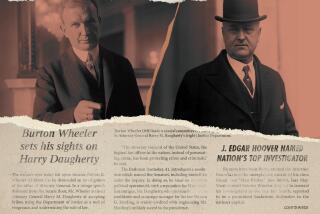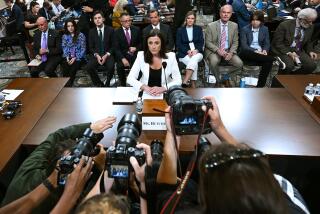Cunningham’s Lawyer Denies Taping of Officials
- Share via
SAN DIEGO — The attorney for Randy “Duke” Cunningham issued a statement Monday denying that the disgraced former congressman had worn a concealed microphone to gather evidence against other public officials but declined to specify whether he wore one in conversations with private individuals.
The statement issued by K. Lee Blalack, attorney for the former eight-term Republican member of the House of Representatives, said that:
“The press, citing unnamed sources, continues to report that Duke Cunningham wore a tape recording device, or wire, to surreptitiously gather evidence on behalf of the government. This story is false.
“Duke has never worn a body wire during any conversations with his former congressional colleagues or any other public official, and he has not surreptitiously gathered evidence against any public officials.”
Blalack, contacted at his Washington, D.C., office, declined to clarify whether Cunningham may have gathered evidence against those who are not public officials, such as lobbyists or military contractors.
But a source close to the investigation, who spoke on the condition of anonymity, confirmed that Cunningham had worn a recording device but provided no further details.
Cunningham resigned from Congress in November after pleading guilty to bribery and tax evasion.
Time magazine last week reported that Cunningham had worn a wire at the behest of the government. The magazine did not specify with whom Cunningham was meeting when he wore the device, but some media outlets have suggested, without providing evidence, that Cunningham may have been talking to members of Congress.
U.S. Atty. Carol Lam declined to comment on the Cunningham statement and media reports about him wearing a hidden microphone.
Jan K. Caldwell, a spokeswoman for the FBI office in San Diego, would not confirm or deny the information in the Time magazine report.
Coming in the wake of the guilty plea of lobbyist Jack Abramoff in an influence peddling case, the story about Cunningham and the recording device caused a stir in media and political circles.
In his Nov. 28 plea agreement with federal prosecutors, the 63-year-old Cunningham promised to help with the ongoing investigation.
The agreement gives no indication of what kind of help Cunningham would provide, or whether he had already helped prosecutors. He faces sentencing Feb. 27 on his guilty plea to taking $2.4 million in bribes and avoiding more than $1 million in federal income taxes.
The agreement lists four unnamed co-conspirators. None has yet been charged. Through subpoenas issued in the case, the four are known to be two military contractors and two persons linked to them.
Although it is known that the contractors -- Mitchell Wade and Brent Wilkes -- gave contributions to other elected officials, nothing in Cunningham’s plea agreement indicates the case involves such officials.
Times staff writer Greg Krikorian contributed to this report.
More to Read
Sign up for Essential California
The most important California stories and recommendations in your inbox every morning.
You may occasionally receive promotional content from the Los Angeles Times.










